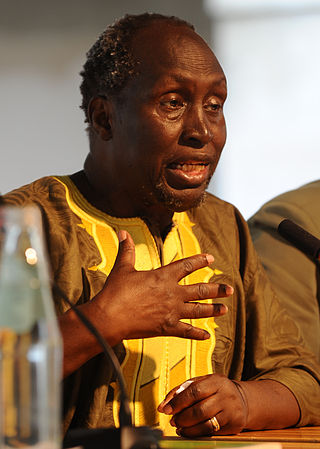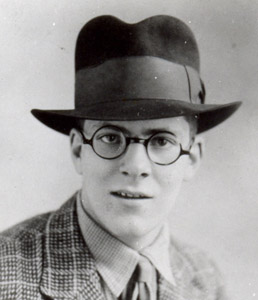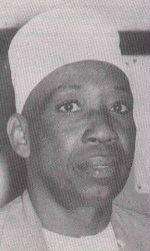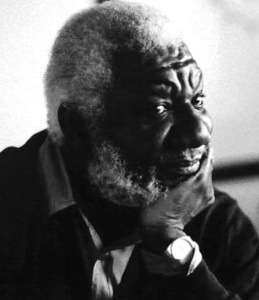Related Research Articles

Angiras or Angira was a Vedic rishi (sage) of Hinduism. He is described in the Rigveda as a teacher of divine knowledge, a mediator between men and gods, as well as stated in other hymns to be the first of Agni-devas. In some texts, he is considered to be one of the seven great sages or Saptarishis, but in others he is mentioned but not counted in the list of seven great sages. In some manuscripts of Atharvaveda, the text is attributed to "Atharvangirasah", which is a compound of sage Atharvan and Angira. The student family of Angira are called "Angira", and they are credited to be the authors of some hymns in the first, second, fifth, eighth, ninth, and tenth books of the Rigveda. By the time of the composition of the Rigveda, the Angirases were an old Rishi clan, and were stated to have participated in several events.
This article contains information about the literary events and publications of 1902.

Ngũgĩ wa Thiong'o is a Kenyan author and academic, who has been described as "East Africa's leading novelist". He began writing in English, switching to write primarily in Gikuyu. His work includes novels, plays, short stories, and essays, ranging from literary and social criticism to children's literature. He is the founder and editor of the Gikuyu-language journal Mũtĩiri. His short story The Upright Revolution: Or Why Humans Walk Upright has been translated into 100 languages.
This article contains information about the literary events and publications of 1893.
This article contains information about the literary events and publications of 1881.

Kofi Awoonor was a Ghanaian poet, author and diplomat. His work combined the poetic traditions of his native Ewe people with contemporary and religious symbolism to depict Africa during decolonization. He started writing under the name George Awoonor-Williams, and was also published as Kofi Nyidevu Awoonor. He taught African literature at the University of Ghana. Professor Awoonor was among those who were killed in the September 2013 attack at Westgate shopping mall in Nairobi, Kenya, where he was a participant at the Storymoja Hay Festival.

Ruthven Campbell Todd was a Scottish poet, artist and novelist, best known as an editor of the works of William Blake, and expert on his printing techniques. During the 1940s he also wrote detective fiction under the pseudonym R. T. Campbell and children's fiction during the 1950s.

Shaaban bin Robert, also known as Shaaban Robert, was a Tanzanian poet, author, and essayist who supported the preservation of Tanzanian verse traditions. Robert is celebrated as one of the greatest Tanzanian Swahili thinkers, intellectuals and writers in East Africa and has been called "poet laureate of Swahili" and is also known as the "Father of Swahili." He is also honoured as the national poet.

Lenrie Leopold Wilfred Peters was a Gambian surgeon, novelist, poet and educationist.

Siaya is a municipality and the capital of Siaya County, Kenya. It is located 74 km (46 mi) northwest of Kisumu. The urban center had a population of 33,153 in 2019.

Frank Marshall Davis was an American journalist, poet, political and labor movement activist, and businessman.

Major Jackson is an American poet and professor at Vanderbilt University. He is the author of six collections of poetry: Razzle Dazzle: New & Selected Poems 2002-2022, The Absurd Man, Roll Deep, Holding Company, Hoops, finalist for an NAACP Image Award for Outstanding Literature-Poetry, and Leaving Saturn, winner of the 2000 Cave Canem Poetry Prize and finalist for a National Book Critics Award Circle. His edited volumes include: Best American Poetry 2019, Renga for Obama, and Library of America's Countee Cullen: Collected Poems. His prose is published in A Beat Beyond: Selected Prose of Major Jackson. He is host of the podcast The Slowdown.
Abdilatif Abdalla is a Kenyan writer and political activist. He was imprisoned for his support of the Kenya People's Union, and began writing poetry in solitary confinement. A collection of poems from this time were published as a book titled Sauti ya Dhiki (1973), which was awarded the Jomo Kenyatta Prize for Literature.
Up to the second half of the 20th century, Tanzanian literature was primarily oral. Major oral literary forms include folktales, poems, riddles, proverbs, and songs. The majority of the oral literature in Tanzania that has been recorded is in Swahili, though each of the country's languages has its own oral tradition. The country's oral literature is currently declining because of social changes that make transmission of oral literature more difficult and because of the devaluation of oral literature that has accompanied Tanzania's development. Tanzania's written literary tradition has produced relatively few writers and works; Tanzania does not have a strong reading culture, and books are often expensive and hard to come by. Most Tanzanian literature is orally performed or written in Swahili, and a smaller number of works have been published in English. Major figures in Tanzanian modern literature include Shaaban Robert, Muhammed Said Abdulla, Aniceti Kitereza, Ebrahim Hussein, Abdulrazak Gurnah and Penina Muhando.

Tijan M. Sallah is a Gambian poet and prose writer.
Barbara Kimenye was a British-born writer who became one of the most popular and best-selling children's authors in East Africa, where she lived from the 1950s. Her books sold more than a million copies, not just in Kenya, Uganda and Tanzania, but throughout English-speaking Africa. She wrote more than 50 titles and is best remembered for her Moses series, about a mischievous student at a boarding school for troublesome boys.
Busara was a literary journal published quarterly by the East African Publishing House, and later biannually, by the English Department at the University of Nairobi. It was first published under that name in 1968, and became one of the most influential literary journals of its time in Kenya. Jared Angira became its editor in chief in 1969.
References
- ↑ Knight, Elisabeth (1986). "Kenya". In Gérard, Albert S. (ed.). European-language Writing in Sub-Saharan Africa. John Benjamins. pp. 887–921. ISBN 978-963-05-3834-3.
- 1 2 3 4 "Biografski dodaci" [Biographic appendices]. Republika: Časopis za kulturu i društvena pitanja (Izbor iz novije afričke književnosti) (in Serbo-Croatian). XXXIV (12). Zagreb, SR Croatia: 1424–1427. December 1978.
- ↑ Profile at African Poetry Review.
- ↑ Gikandi, Simon (2003). Encyclopedia of African Literature. London: Taylor & Francis. pp. 32–33. ISBN 978-1-134-58223-5. OCLC 1062304793 . Retrieved 2018-12-04.